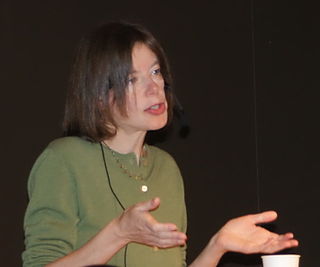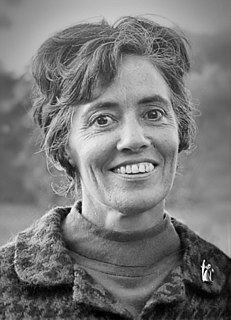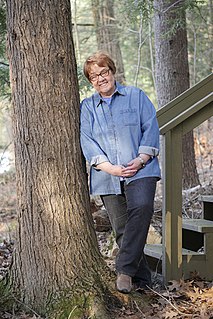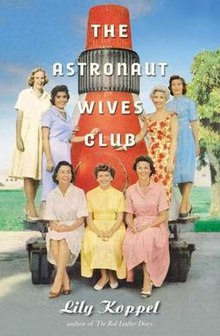
Susan Charlotte Faludi is an American feminist, journalist, and author. She won a Pulitzer Prize for Explanatory Journalism in 1991, for a report on the leveraged buyout of Safeway Stores, Inc., a report that the Pulitzer Prize committee commended for depicting the "human costs of high finance". She was also awarded the Kirkus Prize in 2016 for In the Darkroom, which was also a finalist for the 2017 Pulitzer Prize in biography.

Edward Higgins White II was an American aeronautical engineer, United States Air Force officer, test pilot, and NASA astronaut. He was a member of the crews of Gemini 4 and Apollo 1.

The Right Stuff is a 1983 American epic historical drama film written and directed by Philip Kaufman and based on the 1979 book of the same name by Tom Wolfe. The film follows the Navy, Marine, and Air Force test pilots who were involved in aeronautical research at Edwards Air Force Base, California, as well as the Mercury Seven, the seven military pilots who were selected to be the astronauts for Project Mercury, the first human spaceflight by the United States. The film stars Sam Shepard, Ed Harris, Scott Glenn, Fred Ward, Dennis Quaid, and Barbara Hershey; Levon Helm narrates and plays Air Force test pilot Jack Ridley.

Malcolm Scott Carpenter was an American naval officer and aviator, test pilot, aeronautical engineer, astronaut, and aquanaut. He was one of the Mercury Seven astronauts selected for NASA's Project Mercury in April 1959. Carpenter was the second American to orbit the Earth and the fourth American in space, after Alan Shepard, Gus Grissom, and Glenn.

Walter Marty Schirra Jr. was an American naval aviator, test pilot, and NASA astronaut. In 1959, he became one of the original seven astronauts chosen for Project Mercury, which was the United States' first effort to put human beings into space. On October 3, 1962, he flew the six-orbit, nine-hour, Mercury-Atlas 8 mission, in a spacecraft he nicknamed Sigma 7. At the time of his mission in Sigma 7, Schirra became the fifth American and ninth human to travel into space. In the two-man Gemini program, he achieved the first space rendezvous, station-keeping his Gemini 6A spacecraft within 1 foot (30 cm) of the sister Gemini 7 spacecraft in December 1965. In October 1968, he commanded Apollo 7, an 11-day low Earth orbit shakedown test of the three-man Apollo Command/Service Module and the first crewed launch for the Apollo program.

Leroy Gordon "Gordo" Cooper Jr. was an American aerospace engineer, test pilot, United States Air Force pilot, and the youngest of the seven original astronauts in Project Mercury, the first human space program of the United States. Cooper learned to fly as a child, and after service in the United States Marine Corps during World War II, he was commissioned into the United States Air Force in 1949. After service as a fighter pilot, he qualified as a test pilot in 1956, and was selected as an astronaut in 1959.

James Arthur Lovell Jr. is an American retired astronaut, naval aviator, test pilot and mechanical engineer. In 1968, as command module pilot of Apollo 8, he became, with Frank Borman and William Anders, one of the first three astronauts to fly to and orbit the Moon. He then commanded the Apollo 13 lunar mission in 1970 which, after a critical failure en route, circled the Moon and returned safely to Earth.

The Mercury Seven were the group of seven astronauts selected to fly spacecraft for Project Mercury. They are also referred to as the Original Seven and Astronaut Group 1. Their names were publicly announced by NASA on April 9, 1959; these seven original American astronauts were Scott Carpenter, Gordon Cooper, John Glenn, Gus Grissom, Wally Schirra, Alan Shepard, and Deke Slayton. The Mercury Seven created a new profession in the United States, and established the image of the American astronaut for decades to come.

NASA Astronaut Group 2, also known as the Next Nine and the New Nine, was the second group of astronauts selected by the National Aeronautics and Space Administration (NASA). Their selection was announced on September 17, 1962. The group augmented the Mercury Seven. President John F. Kennedy had announced Project Apollo, on May 25, 1961, with the ambitious goal of putting a man on the Moon by the end of the decade, and more astronauts were required to fly the two-man Gemini spacecraft and three-man Apollo spacecraft then under development. The Mercury Seven had been selected to accomplish the simpler task of orbital flight, but the new challenges of space rendezvous and lunar landing led to the selection of candidates with advanced engineering degrees as well as test pilot experience.

The Powder Puff Derby was the name given to an annual transcontinental air race for women pilots inaugurated in 1947. For the next two years it was named the "Jacqueline Cochran All-Woman Transcontinental Air Race" (AWTAR). It was dubbed the "Powder Puff Derby" in reference to the 1929 Women's Air Derby by humorist and aviation advocate Will Rogers.

Anna Margaret Glenn was an American advocate for people with disabilities and communication disorders and the wife of astronaut and senator John Glenn. A stutterer from an early age, Glenn was notable for raising awareness of stuttering among children and adults as well as other disabilities.

The Mercury 13 were thirteen American women who took part in a privately funded program run by William Randolph Lovelace II aiming to test and screen women for spaceflight. The participants—First Lady Astronaut Trainees as Jerrie Cobb called them—successfully underwent the same physiological screening tests as had the astronauts selected by NASA on April 9, 1959, for Project Mercury. While Lovelace called the project Woman in Space Program, the thirteen women became later known as the Mercury 13—a term coined in 1995 by Hollywood producer James Cross as a comparison to the Mercury Seven astronauts. The Mercury 13 women were not part of NASA's official astronaut program, never flew in space as part of a NASA mission, and never met as a whole group.

The Right Stuff is a 1979 book by Tom Wolfe about the pilots engaged in U.S. postwar research with experimental rocket-powered, high-speed aircraft as well as documenting the stories of the first Project Mercury astronauts selected for the NASA space program. The Right Stuff is based on extensive research by Wolfe, who interviewed test pilots, the astronauts and their wives, among others. The story contrasts the Mercury Seven and their families with other test pilots such as Chuck Yeager, who was considered by many contemporaries as the best of them all, but who was never selected as an astronaut.
Lily Koppel is a writer living in New York City. She is known for her books The Red Leather Diary (2008) and The Astronaut Wives Club (2013).
Betty Lavonne Grissom was the plaintiff in a successful lawsuit against a NASA contractor which established a precedent for families of astronauts killed in service to receive compensation. Her husband Gus Grissom, one of the Mercury Seven astronauts, died in the first fatal accident in the history of the United States space program. Ms. Grissom has been portrayed in the books The Right Stuff (1979) by Tom Wolfe and The Astronaut Wives Club (2013) by Lily Koppel and by the actors Veronica Cartwright and JoAnna Garcia in the film and television adaptations of those books.
Iris Krasnow is an American author, journalism professor, and keynote speaker who specializes in relationships and personal growth. She is the author of Surrendering to Motherhood (1998), the New York Times bestseller Surrendering to Marriage (2002), Surrendering to Yourself (2003), I Am My Mother's Daughter (2007), and The Secret Lives of Wives (2011). Krasnow's sixth book, Sex After...Women Share How Intimacy Changes As Life Changes, was published in February 2014. Krasow's latest book is Camp Girls: Fireside Lessons on Friendship, Courage, and Loyalty. (2020). Krasnow is also the Senior Editor of AARP’s online publication “The Ethel”, for women “who weren’t born yesterday”.

ReneCarpenter was an American newspaper columnist and host of two Washington, D.C., television shows. As the wife of Scott Carpenter, one of the Mercury Seven astronauts, she was a pioneering member of NASA's early spaceflight families.

The Astronaut Wives Club is a 2015 American period drama television series developed by Stephanie Savage for ABC. It is based on Lily Koppel's 2013 book of the same name. The series tells the story of the wives of the Mercury Seven—America's first group of astronauts—who together formed the Astronaut Wives Club. Actresses Dominique McElligott, Yvonne Strahovski, JoAnna Garcia, Erin Cummings, Azure Parsons, Zoe Boyle, and Odette Annable play the roles of the astronauts' wives.

Martha Ackmann is a journalist and author. Her books include The Mercury 13: The True Story of Thirteen Women and the Dream of Space Flight (2003), Curveball: The Remarkable Story of Toni Stone (2010), and These Fevered Days: Ten Pivotal Moments in the Making of Emily Dickinson. Curveball was adapted for the stage by Lydia R. Diamond: Toni Stone had its world premiere with the Roundabout Theatre Company in New York in June 2019. Ackmann's essays and op-eds have appeared in publications including the New York Times, the Washington Post, the Los Angeles Times, and Salon. She is a frequent commentator for New England Public Radio.
The Astronaut Wives Club was an informal support group of women, sometimes called Astrowives, whose husbands were members of the Mercury 7 group of astronauts. The group included Annie Glenn, Betty Grissom, Louise Shepard, Trudy Cooper, Marge Slayton, Rene Carpenter, and Jo Schirra.
















